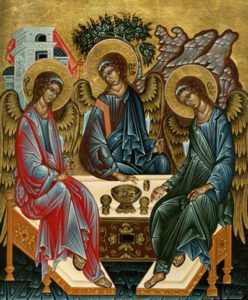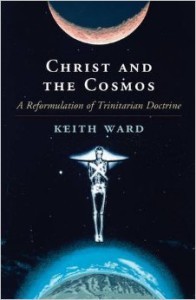Why the Social Trinity is Attractive
Many smart Christians affirm the idea of the social Trinity. And yet Keith Ward says it’s a “bad idea.” It makes sense to evaluate the reasons some Christians like the social Trinity idea on the way to proposing an alternative.
In my previous post, I noted that Ward believes Christians should not say God is comprised of three persons, each with distinct centers of consciousness, distinct freedoms, distinct responsibilities, distinct wills, or distinct relations between one another. Of course, any specific social Trinity theologian may not use all of these phrases. But the social Trinity seems to require belief in a least one.
The problem with saying that God is comprised of three persons with any of these distinctions is that this formulation of the Trinity is more tritheistic than monotheistic. Christians should believe God is one not three.
I also noted in my previous review post that Ward believes Christians should conceive of the Trinity as one God instantiated in three forms. In his book, he uses a variety of descriptions for these three forms or aspects. In one segment, he talks about God as Trinity that includes other-creation, relationship, and inclusion.
Why So Many Find the Social Trinity Appealing
If Ward is right that the social view of the Trinity is problematic, why have so many Christians – including leading 20th century theologians like Jürgen Moltmann, Wolfhart Pannenberg, and John Zizioulas – been attracted to it? The answers vary, and Ward addresses them directly. I won’t spend the time and space required to review all of Ward’s points. Below are points I think especially important.
Scripture
Some adopt the concept of the social Trinity, because they assume scripture supports it. And some passages seem to suggest something like God as three distinct persons.
The Bible is at best ambiguous, however, in its overall support for the idea of the social Trinity. Unfortunately, says Ward, “the social view arises from a dubious projection of the economic trinity onto the immanent trinity” (221). Ward believes Scripture can more easily be marshaled to support his alternative view.
The synoptic gospels, for instance, do not provide a doctrine of the social Trinity. Jesus is not recorded by any of the synoptic gospel writers as claiming to be coeternal with God or a coequal in the Trinity. Such an idea, Ward rightly says, comes from Christian theologians later in history who attempted to understand Jesus’ relation to God.
John’s Gospel is most helpful for crafting a viable doctrine of the Trinity. John speaks of Jesus as the Word become flesh. The Word “is an eternal possibility made actual,” says Ward, “first as an eternal Ideal in the mind of God, and then (incarnated) in a finite subject” (57). The Word is not one divine person among other divine persons.
The New Testament letters can be interpreted as either supporting or undermining the concept of the social Trinity. Biblical writers typically speak of the Spirit as an impersonal force or power, however, not a person. “The spirit is a creative energy of God,” says Ward, “which empowers and fills the inner life of Jesus” (81). Few if any biblical passages speak of the Holy Spirit as having a will.
Ward argues that Christ expresses divine wisdom. The man Jesus expresses Christ by revealing the nature of God as loving and compassionate. The Spirit is active in Jesus, but the Spirit also works with creatures who can express various forms of the cosmic Christ. Christ can be expressed in, as Ward puts it, “a vast throng of created species and forms of life” (71).
Ward spends far more time dealing with the biblical texts pertaining to the Trinity than I do above. I’ve simply noted a few highlights.
Modalism?
Ward affirms a different concept of the Trinity. “The New Testament, taken as a whole,” says Ward, “speaks of God as a dynamic, creative, and relational reality, a reality known in a basic threefold relation to a created world” (72). This threefold relation does not come as three divine persons, however.
This is not modalism, says Ward, if by modalism we mean that God appears as three but has no three-fold reality. Nor is it modalism that says God is revealed successively in three forms, first one aspect, then another, and finally a third.
Ward believes God has a three-fold reality as creator, relater with creation, and transformer of creation. But these are not sequentially revealed. They are aspects of God’s relation to creatures. The words “Father, Son, and Spirit” are symbols of this inherent threefoldness.
In sum, we don’t need a social Trinity of three distinct persons to affirm this three-fold divine reality.
God as Essentially Relational Love
Open and relational theologians are often attracted to the social Trinity, because this view emphasizes the essential relational love of God. To put it differently, many believe the social trinity affirms the relationality necessary for God’s love.
The Christian tradition’s emphasis upon God as “three persons in one substance” has the unfortunate effect of sounding like God is simultaneously three and yet static. Such substantive language is unhelpful. Open and relational theologians argue that God is not static.
If love essentially requires giving and receiving between at least two, saying God is a social trinity of three persons with individual freedoms and intellects supports the view that “God is love.” God can be thought to be everlastingly and necessarily loving, according to this view, because God is everlastingly and necessarily loving within the Trinity. The Cappadocian fathers and, more recently, John Zizioulas argue for the cogency of three divine persons as necessary for a God who essentially loves.
The problem with the social trinity consisting of three persons with distinct relations is that it smacks of tritheism. Three Gods could love each other eternally. But one God, without parts, has no internal divine relations. “We should not think of Father and Son apart from creation as exhibiting mutual, relational, self-giving love,” says Ward (118).
Zizioulas and the Cappadocian fathers rightly stress the “ontological primacy of personhood over impersonal substance,” says Ward. But the social Trinity they espouse results in tritheism (150).
Can God Be Essentially Loving Without Being a Social Trinity
I want to affirm the desire that social Trinity theologians have for saying love is central to God. And I think it makes sense to say a God who is essentially love is also essentially relational. But I agree with Ward that most if not all versions of the social Trinity sound tritheistic.
Is there a way to affirm God as essentially loving without adopting the social Trinity and its tritheistic implications? I believe there is.
I’ll address this in my next post in this ongoing conversation with Keith Ward’s book, Christ and the Cosmos.

Comments
Nothing has been more helpful to me in centralizing love in my theology than the social trinity model. But it doesn’t have the tritheism undertones for me that it seems to have for you. What’s more, to me your post (and perhaps Ward) really undersells the amount of New Testament text that speaks of the relationship between the Father and Son. Why bother with that conversation if it is just God’s ‘creator’ aspect relating to his ‘relates with creation’ aspect. That doesn’t make much sense to me. I take no issue with the ‘three-fold reality’ language. I think the social trinity can be staunchly monotheistic, but I appreciate hearing your (and Ward’s thoughts).
Hi, Tom! I love your blog and your writing. I too am drawn to Ward’s thinking, but I have some questions that you might want to ponder in a future blog. First, is Ward so committed to philosophical idealism that he tries to force Christian theology into that mold? In his theology philosophical idealism appears to provide unity for all of his thinking and to be the interpretive lens through which he understands the Trinity and much of scripture. I know that no theology escapes the influences of culture and worldviews, but it is good to be aware of it. Second, does he really engage scripture thoroughly on this matter of “Threeness?” He references the Gospel of John in his book, but he doesn’t really address it in its totality. How, for example, would he explain Jesus’ words in John 17:5? “So now, Father, glorify me in your own presence with the glory that I had in your presence before the world existed.” It appears that this text, and others, leads one to think that Jesus is saying that there was with the Father from all eternity another being that shared in the divine life. Admittedly, there are problems with social trinitarianism. All of its talk about a “divine dance” is just mushy and vague sentimentalism, and its discussion about a community of persons that becomes a model for human communities is really our projection onto God of our deepest desires. However, can there not still be three beings sharing equally in the qualities of God’s life? When I read Athanasius or even modern theologians, like Thomas Torrance, I don’t get the feeling that they are talking about a “three-fold reality”, but actual concrete eternal entities, three subjects. And then when you read even modern Eastern Orthodox theologians, you get the same sense: The Father is God who dwells eternally with the Son and the Spirit. I think they see this three-fold reality as three distinct entities sharing in the divine life together. Good food for thought! Thank you letting me share my ramblings on this important topic!
Matthew,
I hope the final two installments in this review are helpful in answering your questions here.
Tom
Russell,
1. Yes, Ward is committed to idealism, and I’m sure that influences his thinking. One need not be an idealist to agree with his criticism of the social trinity, however.
2. Ward does address John’s gospel well, although I can’t recall off the top of my head what he says about the passage you mention.
Overall, the more we talk about “concrete eternal entities,” the more Ward thinks this sounds tritheistic. I tend to agree with him. But I also think there are advantages to saying God everlastingly has relations of love with others. My counterproposal, spelled out briefly in the 4th installment of this review, shows how God could have such everlasting love relations and yet not be trinitarian in the social Trinity sense.